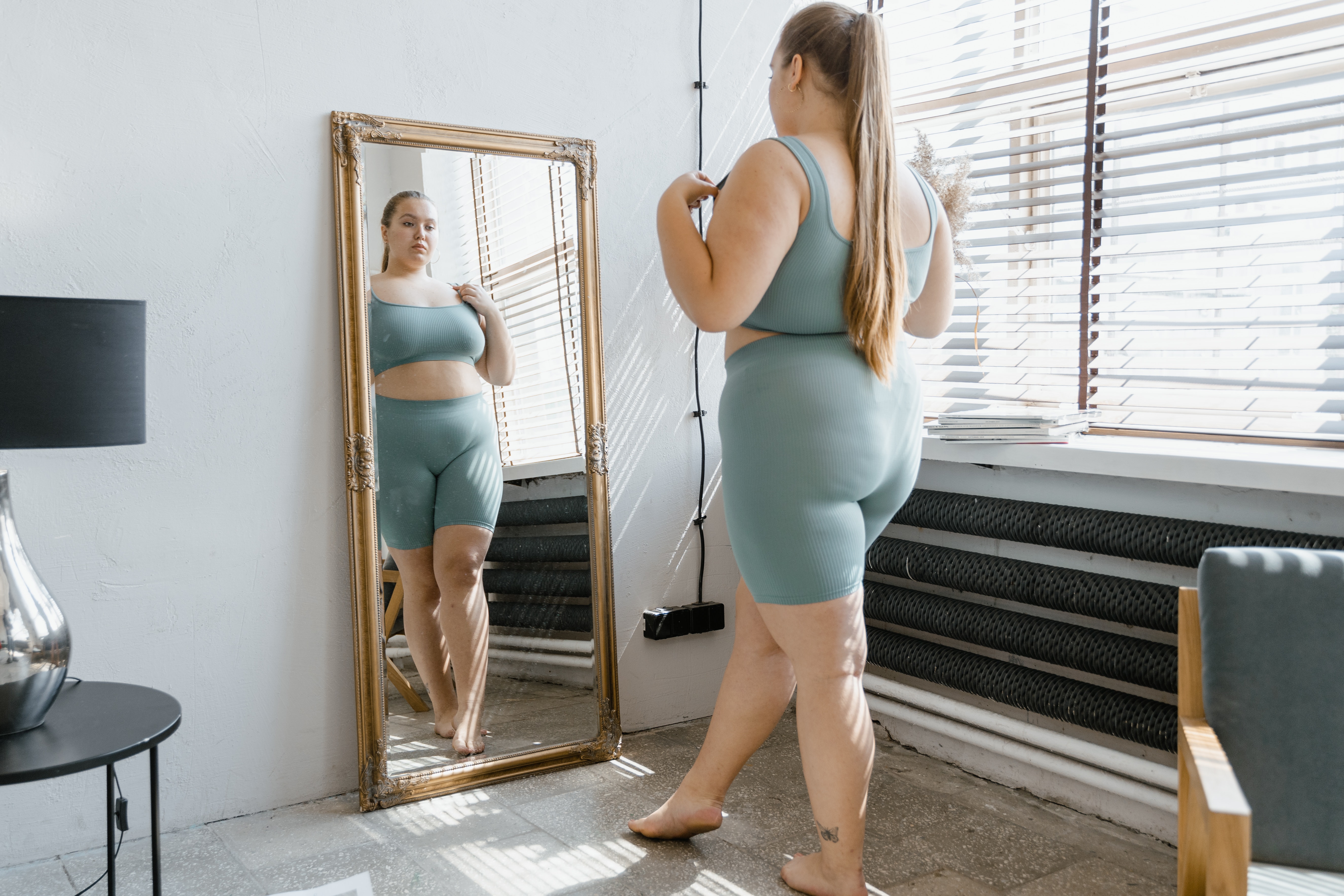Polycystic ovarian syndrome (PCOS) is a hormonal disorder that affects approximately 10 percent of menstruators globally. There are many challenges faced by people with this condition. Some of the symptoms seen in PCOS include acne, hair loss, mood dysregulation, fertility issues, hirsutism (excess growth of thick, coarse hair), acanthosis nigricans, and the list goes on. Not everyone has all these symptoms, but many people have some combination of them.
Apart from managing personal health, socially constructed views of femininity are challenged by the manifestations of the condition, and other aspects of it affect one’s relationship with others, their environments, and themselves. I’ll highlight a small part of the conversation around PCOS pertaining primarily to fatphobia, diet culture, and a lack of compassion, while sharing a few insights garnered through research, online forums, and my private practice, which revolves primarily around PCOS.
DIET CULTURE, FATPHOBIA & BEAUTY STANDARDS
Toxic diet culture, patriarchal beauty standards, and capitalism have so many of us wrapped up in constant efforts to shrink ourselves, be workhorses, and spend much of our precious time on this planet pursuing an image of beauty that is always changing and not at all inclusive. One of the treatment strategies that is often recommended to PCOS patients is weight loss—a modest weight reduction has been associated with the restoration of ovulation and improvement in hormonal and metabolic profiles (like testosterone and cholesterol respectively). Unfortunately, this is recommended as a sole treatment strategy way too often without understanding the person seeking care or PCOS.
“Fatphobia is rife in the medical system and is deeply problematic.”
People with PCOS experience high rates of body dissatisfaction, body dysmorphia, mood disorders, and disordered eating patterns. Combined with online fad diets, gimmicky cleanses, and baseless exercise advice, there is also a high rate of confusion around what’s actually helpful.
Questions I often answer in my practice include:
- Should I avoid fruits?
- I heard intermittent fasting was good for PCOS, is that true?
- Is it okay to do high-intensity exercise?
- Should I stop eating carbs because they cause insulin resistance?
There is also a significant amount of dismissal and a lack of clarity about treatment options:
- My doctor told me to come back when I want to get pregnant.
- I was told I was lazy and needed to diet.
- All my doctor said was that I’ll have fertility problems.
- My endocrinologist didn’t even ask me about any changes I’ve made.
Of course, there are lovely and supportive practitioners who do their jobs well (and I probably have a slightly skewed population in my practice of people seeking more than is offered, so I hear about patient encounters like this quite often), but we can and need to do better.
There is an unparalleled emphasis placed on weight loss by both practitioners and patients (and probably people in patients’ lives), even though there are other, and better, metrics of health. Fatphobia is rife in the medical system and is deeply problematic. It not only perpetuates shame, guilt, and low self-esteem, but also dissuades many people who deserve patient-centred care from seeking medical support. And this is all done without even mentioning how wildly unsuccessful weight loss is for most people in the long run. Because of caloric restriction, most weight loss attempts make people feel miserable (tired and irritable, anyone?) In my personal experience with PCOS patients, weight loss has often been inappropriately prescribed to people who are already restricting food, have body dysmorphia, and/or have diagnosed eating disorders because there was no discussion regarding the patient’s medical and personal history.

CHANGING THINGS UP
Honestly, I’m not entirely sure what the best way forward is. What I do know is that we have a vast array of research and strategies to support people with PCOS including hearing them out, validating their experiences, discussing this diagnosis and what it might mean, reviewing their symptoms and goals, answering their questions, discussing treatment options, referring out, and re-evaluating at appropriate intervals.
Treatment plans should include discussions about how genetics are involved, how mental health and nutrition play a role, how family of origin and other structural factors contribute, and so much more. We need to stop hyper-focusing on weight as the most important measure of health and ditch Body Mass Index (BMI) as an individual-level measurement of health, as it was designed as a population-level metric.
Instead, our focus should be on building infrastructure and education so people can afford fresh produce, move more, have time to rest and recover, connect with other people, get good sleep, and have less stress.
If you are someone with PCOS reading this article, please know that this condition is not your fault.
Considerations for Someone with PCOS:
- Advocate for referrals and/or seek out supportive healthcare practitioners who are trained in PCOS.
- Focus on moving more and building muscle. Muscle protects bones, helps with insulin resistance often seen in PCOS, improves mental health and sleep, and supports cardiovascular health.
- Don’t follow random online advice without vetting that information.
- Feel free to call your doctor out on fatphobia and ask about what other metrics of health (like cholesterol levels, weekly exercise, etc.) you can focus on.
- Avoid restrictive diet plans that take the joy out of your life. Focus on balanced meals that contain protein, whole-grain carbohydrates, and fats. Eat plenty of plant foods, like whole grains, fruits, vegetables, legumes, and seeds.
- Work on stress management, prioritize sleep, get to know yourself, and build in time for people you love and activities you enjoy.
- Seek out mental health support if you need help with disordered eating, body image issues, mood, and life in general.
- Try to stop comparing yourself to others, especially to curated social media highlight reels.
- If you’re trying to lose weight, seek out care, have a timeline, and don’t restrict your diet so much that you’re barely eating. Try to eat as much as possible while being in a mild caloric deficit.
- Start or continue having more open conversations with friends and family, in healthcare appointments, medical schools, research, the media, social media, and policy discussions. Introduce more nuance to dismantle the systems that keep us feeling less than enough.
- Ditch the self-blame that is prevalent in today’s health and wellness culture; complex, multifaceted health issues have somehow been reduced to being the patient’s fault for not doing better. Don’t get me wrong, lifestyle and nutrition constitute modifiable risk factors in many conditions and play significant roles in health, but they’re not everything.
- Remember: PCOS, like many lifelong conditions, has genetic components that are influenced by one’s environment and upbringing. The social determinants of health—the non-medical factors that contribute to health and disease like socioeconomic status, education, geography, resource availability, etc.—are not discussed enough, even though they influence health (and PCOS) greatly.
LET’S DO BETTER
PCOS is a multifaceted condition. As such, support for people with this condition also has to be nuanced. We must do better to discard our tendency to reduce complex issues to black-and-white thinking when it comes to health and wellness. We all come from different backgrounds with unique predispositions and environments and have varying access to resources.
Racism, sexism, ageism, ableism, and fatphobia are woven into the fabric of the lives we live, including in the medical system—healthcare practitioners are simply people subject to all this stuff too! If you want to lose weight, that’s your prerogative. However, I hope you think twice about where that desire comes from and what you’re going to gain (and lose) along the way, while also understanding that “beauty ideals” are arbitrary and have varied from place to place and from time to time. Focusing on healthy habits will always trump the size of your body, and that’s the conversation that I will continue to have with my patients.
You May Also Like: Natural Ways to Treat PCOS (Polycystic Ovary Syndrome), The Mental and Emotional Impacts of PCOS, What Causes PCOS?.






